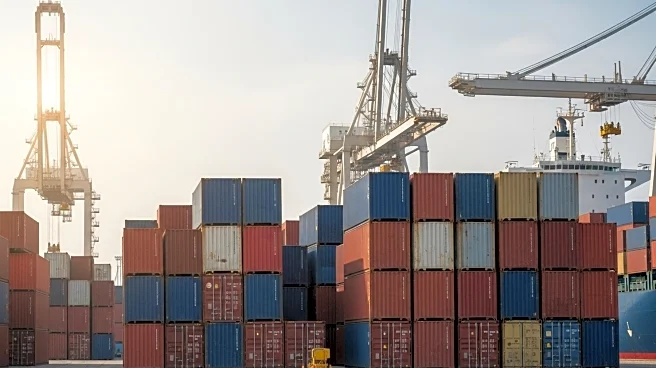What's Happening?
Maritime Strategies International (MSI) has released a new analysis indicating that the demand side of the global container trade industry is more insulated from US tariffs than previously anticipated. Chinese exporters have continued to export their surplus manufactured goods, particularly to emerging economies, which has significantly buoyed trade throughout the year. MSI's Q3 market report, 'Faltering Freight,' highlights a strong start to 2025 for global container trade, with a 4.9% year-on-year expansion in Q1 and a 4.4% growth in Q2. Despite volatility in the Transpacific trade, volumes have increased by nearly 6% year-to-date through August. MSI forecasts a contraction in mainlane headhaul trade in 2026, driven by slower growth in Asia-Europe trades and the Transpacific. However, the competitiveness of Chinese exports remains a key driver of trade growth.
Why It's Important?
The resilience of Chinese exports amid US tariff threats has significant implications for global trade dynamics. By maintaining robust export levels, China supports the stability of global container trade, which is crucial for international supply chains and economic growth. Emerging economies benefit from increased access to Chinese goods, potentially enhancing their economic development. The continued strength of Chinese exports may also influence US trade policy and negotiations, as tariffs appear less effective in curbing China's trade influence. This situation underscores the interconnectedness of global economies and the challenges of implementing effective trade barriers.
What's Next?
MSI has revised its projections for 2026, anticipating a more muted pace of expansion in global container trade. The focus will likely remain on the competitiveness of Chinese exports and their impact on trade volumes. Stakeholders, including policymakers and businesses, may need to reassess strategies in response to these dynamics. Potential adjustments in US trade policy could arise as the effectiveness of tariffs is evaluated. Additionally, emerging economies may continue to strengthen trade ties with China, further influencing global economic patterns.
Beyond the Headlines
The ongoing trade dynamics highlight broader geopolitical implications, as China's export resilience may shift power balances in international trade. The effectiveness of tariffs as a tool for influencing trade may be questioned, prompting discussions on alternative strategies for managing global trade relations. The situation also raises ethical considerations regarding the impact of trade policies on developing economies and their access to global markets.










